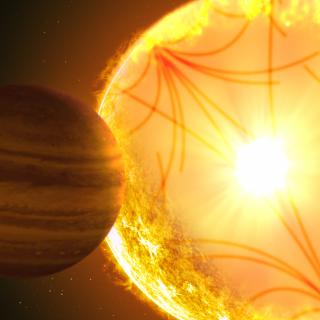Bibcode
Mosser, B.; Michel, E.; Appourchaux, T.; Barban, C.; Baudin, F.; Boumier, P.; Bruntt, H.; Catala, C.; Deheuvels, S.; García, R. A.; Gaulme, P.; Regulo, C.; Roxburgh, I.; Samadi, R.; Verner, G.; Auvergne, M.; Baglin, A.; Ballot, J.; Benomar, O.; Mathur, S.
Bibliographical reference
Astronomy and Astrophysics, Volume 506, Issue 1, 2009, pp.33-40
Advertised on:
10
2009
Journal
Citations
84
Refereed citations
59
Description
Context: The CoRoT short runs give us the opportunity to observe a large
variety of late-type stars through their solar-like oscillations. We
report observations of the star HD 175726 that lasted for 27 days during
the first short run of the mission. The time series reveals a
high-activity signal and the power spectrum presents an excess due to
solar-like oscillations with a low signal-to-noise ratio. Aims:
Our aim is to identify the most efficient tools to extract as much
information as possible from the power density spectrum. Methods:
The most productive method appears to be the autocorrelation of the time
series, calculated as the spectrum of the filtered spectrum. This method
is efficient, very rapid computationally, and will be useful for the
analysis of other targets, observed with CoRoT or with forthcoming
missions such as Kepler and Plato. Results: The mean large
separation has been measured to be 97.2±0.5 μHz, slightly
below the expected value determined from solar scaling laws. We also
show strong evidence for variation of the large separation with
frequency. The bolometric mode amplitude is only 1.7±0.25 ppm for
radial modes, which is 1.7 times less than expected. Due to the low
signal-to-noise ratio, mode identification is not possible for the
available data set of HD 175726.
The CoRoT space mission, launched on 2006 December 27, was developed and
is operated by the CNES, with participation of the Science Programs of
ESA, ESAs RSSD, Austria, Belgium, Brazil, Germany and Spain.
Related projects

Helio and Astero-Seismology and Exoplanets Search
The principal objectives of this project are: 1) to study the structure and dynamics of the solar interior, 2) to extend this study to other stars (either single or in binary systems), 3) to search for extrasolar planets using photometric methods (primarily by transits of their host stars) and their characterization with complementary radial
Savita
Mathur